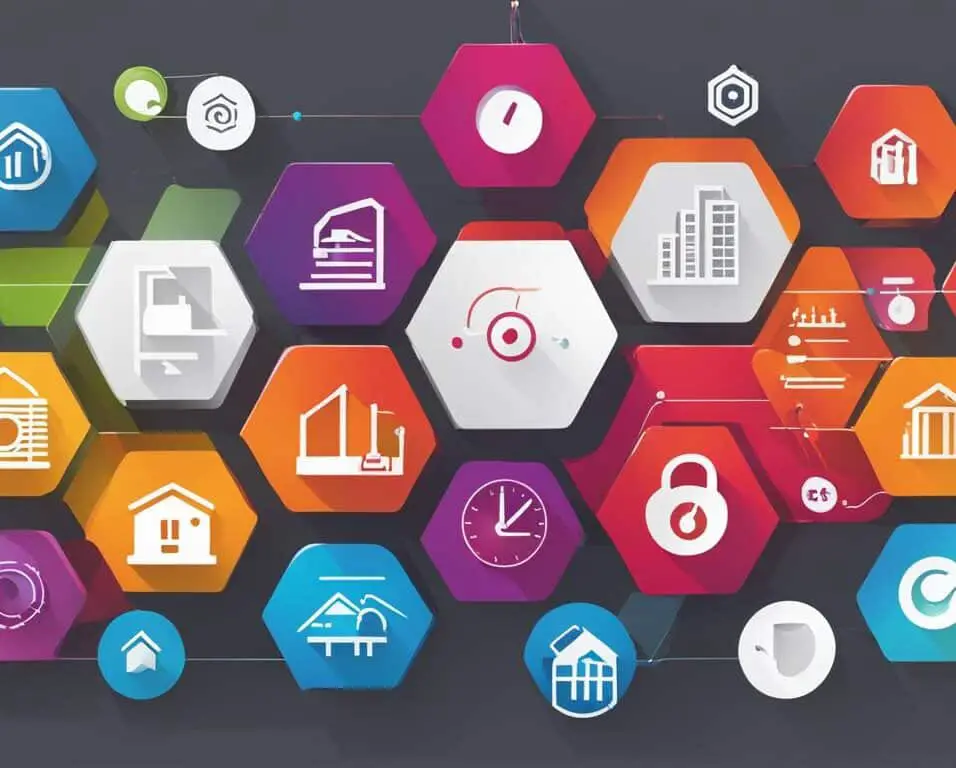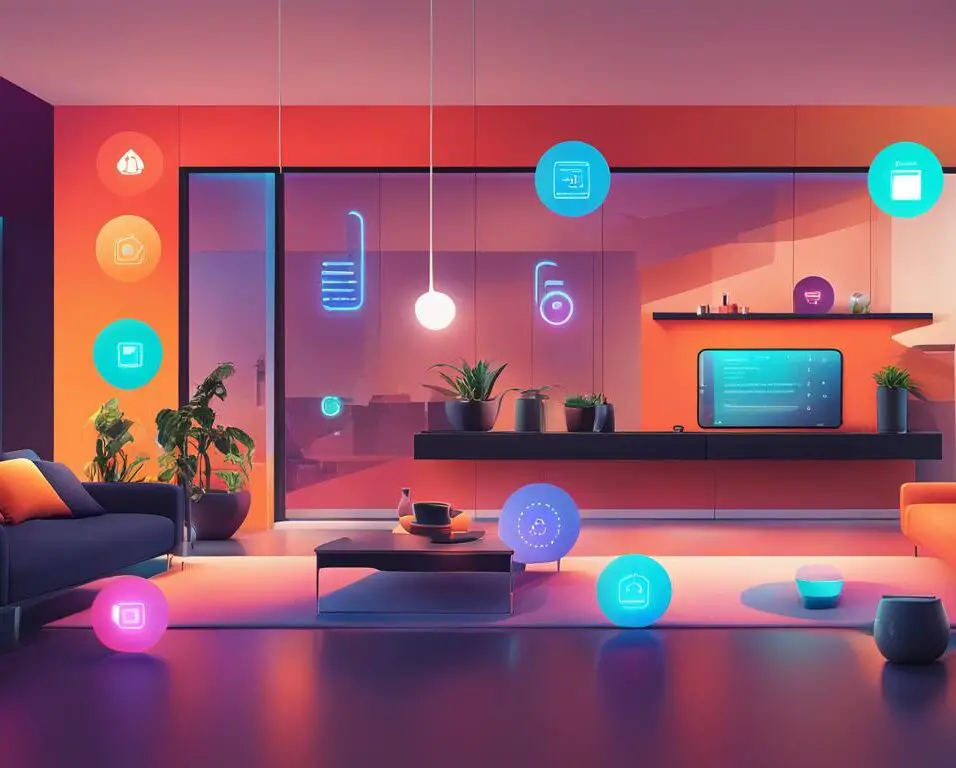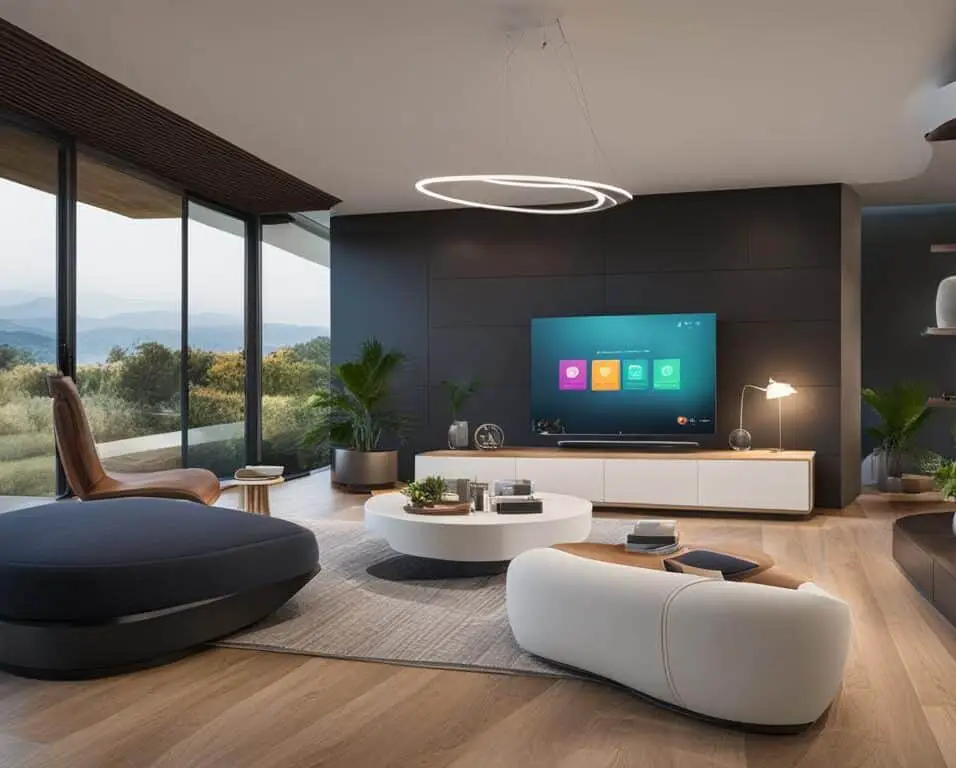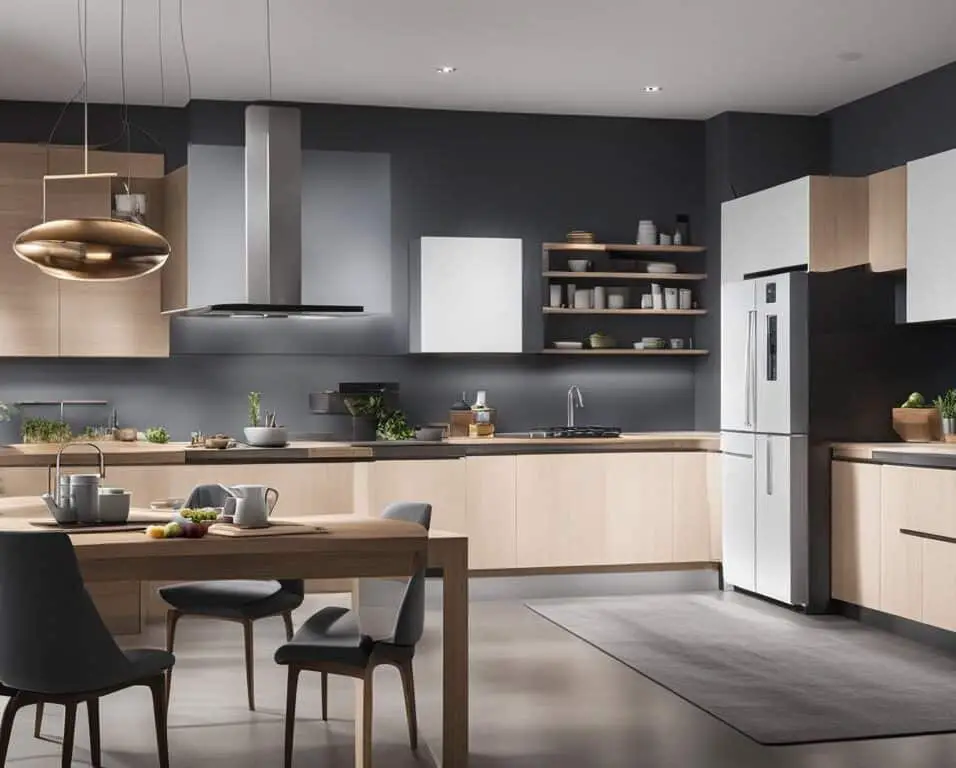Transforming Homes with AI Automation Technologies
The advancement of technology has revolutionized the way we live and interact with our homes. AI and automation have transformed homes into smarter, more convenient, and efficient living spaces. The emergence of AI-powered virtual assistants, such as Amazon’s Alexa and Google Assistant, has revolutionized home automation. These AI assistants can seamlessly integrate with various smart devices and allow homeowners to control and manage their connected devices through voice commands. Additionally, AI-powered smart security systems offer enhanced protection and peace of mind, while intelligent HVAC systems optimize energy usage. The future of home living holds even more possibilities, such as increased personalization, integration of health and wellness monitoring, and AI-powered smart appliances.
Key Takeaways:
- Smart home automation technologies powered by AI enable homes to become more efficient and convenient.
- AI-powered virtual assistants like Amazon’s Alexa and Google Assistant have transformed the way we interact with our homes.
- AI plays a crucial role in enhancing the efficiency and convenience of home automation, offering benefits such as improved security and energy savings.
- The integration of AI into smart home devices and systems is driving the growth of the global smart home market.
- The Matter standard allows for seamless interoperability between smart home devices, enhancing the potential of AI in smart home automation.
The Rise of AI-powered Smart Home Automation
The growth of AI-powered smart home devices has led to the rise of smart home automation. AI technology, particularly machine learning algorithms, has transformed the way we interact with our homes. The global smart home market is projected to reach a value of $135 billion by 2025, driven by the increasing number of connected devices and the convenience and value they bring to homeowners.
AI-powered smart home automation offers a range of benefits such as enhanced convenience, energy efficiency, improved security, and personalization. With the integration of AI in smart homes, features like voice assistants have evolved from transactional tools to collaborative partners, suggesting new ways for smart homes to work based on user behavior. The potential of AI in smart homes goes beyond automation to revolutionize healthcare and enhance the interaction with smart home devices.
Enhancing Efficiency and Convenience with AI in Home Automation
AI plays a crucial role in revolutionizing home automation, providing homeowners with enhanced efficiency and convenience. By harnessing the power of machine learning algorithms, AI systems can learn and adapt to individual preferences, creating a seamless and personalized automation experience.
The benefits of AI in home automation are extensive, ranging from improved smart access control and home security to energy savings and increased efficiency. With AI-powered smart home systems, homeowners can enjoy customized automation routines tailored to their behaviors and patterns.
“AI in home automation brings a level of convenience and intelligence that was unimaginable just a few years ago. It allows homeowners to effortlessly control and manage their smart home devices, creating a truly connected and efficient living space.”
– John Johnson, CEO of Smart Home Solutions
Imagine waking up to a warm and well-lit home, precisely tailored to your preferences. AI-powered smart home systems can optimize lighting, temperature, and energy usage based on individual behaviors and environmental factors, ensuring maximum comfort and energy efficiency.
AI in home automation also opens up a world of unique possibilities. For example, smart mirrors with AI assistants can provide personalized recommendations and assist with daily routines. Robotic chef assistants can revolutionize the way we prepare meals, offering convenience and precision in the kitchen.
The Benefits of AI in Home Automation:
- Improved Smart Access Control and Home Security: AI-powered systems can detect anomalies, monitor activity patterns, and enhance home security through facial recognition and smart surveillance.
- Energy Savings and Increased Efficiency: AI algorithms can optimize energy usage by analyzing user behavior and adjusting smart devices accordingly, leading to reduced energy consumption and lower utility bills.
- Enhanced User Experience: AI enables smart home systems to learn and adapt to individual preferences, providing a personalized and intuitive experience. Voice commands, predictive actions, and seamless integration across devices make controlling the smart home effortless and enjoyable.
AI in Home Automation: A Glimpse into the Future
As AI continues to advance, the future of home automation holds even more exciting possibilities. From AI-powered pet and plant controllers that can care for your beloved companions to intelligent home health monitoring systems that provide personalized wellness insights, the potential for AI in home automation is vast.
The integration of AI into home automation creates a sophisticated and efficient living space, offering homeowners a truly connected and intelligent home environment. With the proliferation of AI in the smart home industry, we can expect continuous advancements and innovations that will redefine the way we live and interact with our homes.
Experience the power of AI in home automation and embrace the benefits it brings to enhance your daily life.

AI’s Imprint on the Smart Home Landscape
AI has revolutionized the smart home landscape, leaving a lasting impression on the industry. The integration of AI into smart products reflects the current trend, driving the growth of the smart home market. By harnessing the power of AI, smart home systems have become more intelligent, learning from user preferences and behaviors to create customized automation routines. These systems adapt to individual behaviors, optimizing lighting, temperature, and energy usage for a seamless and personalized experience.
The global smart home automation market is projected to grow at an impressive annual rate of 27.3% from 2023 to 2030, fueled by the capabilities of AI-powered devices. This surge in demand is a testament to the value that AI brings to smart homes. With AI, homeowners can enjoy the convenience of voice-controlled assistants, advanced security solutions, and energy-efficient systems that adapt to their needs.
The impact of AI on the smart home landscape can be seen in the development of unique technologies. Smart mirrors with AI assistants and robotic chef assistants are just a glimpse of the innovations powered by AI in the smart home industry. As AI continues to evolve, the future of smart homes holds even more exciting possibilities.
Here’s a closer look at some of the AI-powered devices that have reshaped the smart home market:
| AI-Powered Device | Description |
|---|---|
| Voice Assistants | AI-powered voice assistants, such as Amazon’s Alexa and Google Assistant, have become essential companions in smart homes, enabling users to control their devices with natural language commands. |
| Smart Security Systems | AI-powered smart security systems offer enhanced protection and peace of mind, using advanced algorithms to detect and respond to potential threats. |
| Intelligent HVAC Systems | AI-powered HVAC systems optimize energy usage by learning from user patterns and environmental factors, ensuring comfort while reducing energy consumption. |
With the widespread adoption of AI in smart home devices, the future holds endless possibilities. AI-powered advancements will continue to redefine the way we live and interact with our homes. The smart home landscape is evolving, and AI is at the forefront, enhancing efficiency, convenience, and overall quality of life.
document.querySelector("img").style.display = "block";
document.querySelector("img").style.margin = "0 auto";
AI Runs Deep in Smart Home Tech
AI is revolutionizing the way we interact with our homes, as it is deeply embedded in smart home technology. Voice assistants, such as Amazon’s Alexa and Siri, have been powered by AI technology, enabling users to effortlessly control smart devices through natural language processing.
These AI-powered voice assistants have transformed the way we interact with our homes, making it more convenient and efficient. Instead of manually operating individual devices, homeowners can simply issue voice commands and have their smart devices respond accordingly.
But AI in smart home tech goes beyond just device control. With the advancement of generative AI, voice assistants are moving from transactional interactions to collaborative partnerships. They can actively engage with users, understand their preferences, and provide personalized recommendations.
“AI-powered voice assistants are no longer just tools; they are becoming indispensable partners in our homes, helping us achieve a seamless and personalized smart home experience.”
One of the key advantages of AI in smart home tech is its ability to enhance security and safety. AI-powered devices can analyze security footage, detect suspicious activities, and send real-time alerts to homeowners. This ensures greater peace of mind and provides an added layer of protection for homes and their occupants.
Moreover, AI in smart home tech enables predictive maintenance, allowing homeowners to address potential issues before they escalate. By analyzing data from various devices, AI systems can detect patterns and anomalies that indicate potential problems. This proactive approach helps prevent costly repairs and ensures the optimal performance of smart home devices.

The Evolution of AI in Smart Home Technology
The evolution of AI in smart home technology can be seen in the optimization of energy usage. AI-powered HVAC systems can analyze user patterns, environmental factors, and energy rates to automatically adjust temperature and lighting settings, minimizing energy waste and reducing utility bills.
Furthermore, AI enables smart home appliances to provide cutting-edge capabilities. For example, AI-powered security solutions can utilize face recognition technology to provide advanced access control and security features. This ensures that only authorized individuals can enter the home, enhancing overall safety.
The integration of AI in voice assistants has unlocked new possibilities for the future of smart homes. As generative AI continues to evolve, voice assistants can become even more intuitive, anticipating user needs and suggesting actions without explicit commands.
AI in Smart Home Technology Benefits at a Glance:
- Effortless control of smart devices through voice commands
- Enhanced security footage analysis and real-time alerts
- Predictive maintenance to prevent potential issues
- Personalized recommendations and suggestions
- Optimized energy usage for cost savings
The Role of AI in Smart Home Technology
| Smart Home Technology | AI Integration | Benefits |
|---|---|---|
| Voice Assistants | Powered by AI technology | Effortless device control, personalized recommendations |
| Security Systems | AI-powered analysis of security footage | Enhanced security, real-time alerts |
| Smart Appliances | AI-enabled capabilities | Face recognition for advanced access control, optimized energy usage |
This Is Where Matter Comes In
The Matter standard is an important development in the advancement of smart homes. It enables seamless interoperability between smart home devices, allowing them to communicate with each other regardless of the manufacturer. This standard, backed by major players like Google and Apple, ensures that smart home devices can be controlled by different voice assistants without the need to choose a single platform.
The adoption of the Matter standard enhances the potential of generative AI in the smart home experience. AI-powered devices can access a vast dataset to personalize the smart home experience for individual homeowners. The combination of AI and the Matter standard opens up a new realm of possibilities for AI-powered smart home automation.
With the Matter standard, homeowners can enjoy the benefits of interoperability in their smart home devices, creating a seamless and integrated experience. Regardless of the brand or manufacturer, devices that adhere to the Matter standard can work together harmoniously, allowing for a truly interconnected and intelligent home environment.
With the Matter standard in place, homeowners no longer have to worry about compatibility issues or being locked into a single ecosystem. They have the freedom to choose the voice assistant that suits their needs while still enjoying the full capabilities of their smart home devices.
Benefits of the Matter Standard:
- Promotes interoperability between smart home devices
- Allows for seamless communication between devices regardless of the manufacturer
- Enables control of devices through multiple voice assistants
- Facilitates personalized experiences through AI-powered devices
- Enhances the potential of generative AI in smart home automation
The Matter standard is a significant step forward in the evolution of smart homes. It brings together the power of AI with interoperability, creating a more connected, efficient, and personalized home experience for homeowners.
Conclusion
AI-powered smart home automation is revolutionizing the way we live, transforming our homes into sophisticated and seamless living spaces. With AI at the core, smart homes are becoming more convenient, secure, energy-efficient, and personalized. As the global market for smart home automation continues to grow, driven by AI-powered devices and advanced integration, the future of smart homes looks incredibly promising.
The imprint of AI on the smart home landscape is evident in the rise of voice assistants like Amazon’s Alexa and Google Assistant, offering hands-free control of connected devices. Advanced security solutions powered by AI enhance the safety and peace of mind of homeowners, while optimized energy usage ensures energy efficiency and cost savings.
The future holds even greater advancements in the field of smart home automation, with AI-powered technologies set to take luxury living to the next level. Imagine smart mirrors that provide personalized recommendations and robotic assistants that automate everyday tasks. Moreover, AI-powered controllers for pets and plants will ensure their well-being even when you’re not around.
With AI-powered smart home automation, luxury living meets cutting-edge technology, creating a personalized and elegant home experience. The future of smart homes is bright, redefining how we live, interact with, and enjoy our living spaces. Get ready to embrace the future and unlock the full potential of AI in your home.
FAQ
What is smart home automation?
Smart home automation refers to the use of AI and technology to automate various aspects of a home, such as lighting, temperature control, security systems, and entertainment devices. It allows homeowners to control and manage their connected devices through voice commands or smartphone apps.
How does AI enhance smart home automation?
AI enhances smart home automation by utilizing machine learning algorithms to learn and adapt to homeowners’ preferences. This makes the automation process seamless and tailored to their needs. It enables customized automation routines based on individual behaviors and patterns.
What are the benefits of AI in home automation?
AI offers several benefits in home automation, including improved smart access control and home security, energy savings and increased efficiency, enhanced user experience, and personalized automation routines based on individual behaviors and patterns.
How is AI integrated into smart home devices?
AI is integrated into smart home devices through voice assistants, such as Amazon’s Alexa and Siri, which are powered by AI technology. These voice assistants allow users to control smart devices through natural language processing, making interactions more convenient and intuitive.
What is the Matter standard in smart homes?
The Matter standard is a development that enables seamless interoperability between smart home devices. It ensures that these devices can communicate with each other regardless of the manufacturer, allowing homeowners to control their devices using different voice assistants without the need to choose a single platform.
How does AI revolutionize the smart home experience?
AI revolutionizes the smart home experience by enhancing convenience, security, energy efficiency, and personalization. It enables advanced features such as predictive maintenance, personalized recommendations, and optimized energy usage based on user patterns and environmental factors.
What is the future of smart homes with AI?
The future of smart homes with AI holds endless possibilities. It includes advancements such as increased personalization, integration of health and wellness monitoring, and AI-powered smart appliances. AI will continue to redefine the way we live and interact with our homes, creating a personalized and elegant living experience.








